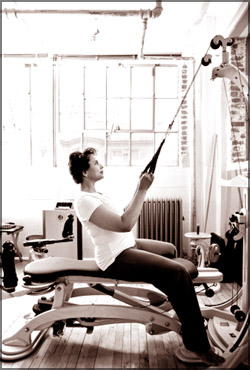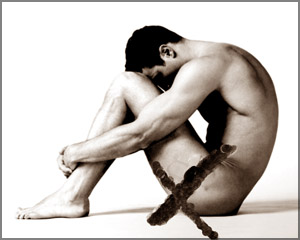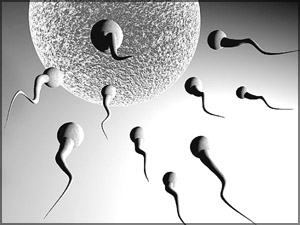
Ways to avoid infections at the gym
As much as I'd enjoy the view in an NFL locker room, after reading
the latest news on Staphylococcus infections in football players, I will
pass up any forthcoming invitations. As this ESPN.com story nicely
summarizes, the Cleveland Browns's Kellen Winslow is only the latest
player to develop an infection from staph, which usually sits harmlessly
on our skin but can turn dangerous when it gets into our bodies via a
cut or scrape.
 Other
high school, college, and pro athletes in sports including wrestling and
baseball have also come down with staph infections in recent years, in
some cases the potentially deadly strain that is immune to antibiotics.
It's not always clear where these and other infections originate, but
athletes are at risk because they tend to get nicks and cuts, to have
skin-to-skin contact with teammates and opponents, and to share
equipment and towels. Other
high school, college, and pro athletes in sports including wrestling and
baseball have also come down with staph infections in recent years, in
some cases the potentially deadly strain that is immune to antibiotics.
It's not always clear where these and other infections originate, but
athletes are at risk because they tend to get nicks and cuts, to have
skin-to-skin contact with teammates and opponents, and to share
equipment and towels.
That doesn't give you another excuse to hit the snooze button rather
than working out, however. Doctors say the benefits of exercise far
outweigh the small chance of acquiring staph or another infection at the
gym or in the course of your fitness routine. And, they say, you can
take some common-sense steps to protect yourself:
Make sure the equipment is clean. Most exercisers won't have a lot of
intimate contact with other gym-goers. But they will use the same
exercise balls, spinning bikes, and weight machines. Gyms are supposed
to regularly clean off the equipment, but you should take your own
precautions.
"Emphasize hygiene as much as you can," says Richard Wenzel, chair of
the Department of Internal Medicine at Virginia Commonwealth University
and expert on antibiotic-resistant infections. Wiping a machine off with
a hand towel is not sufficient. Many gyms have their own disposable wipe
dispensers. If yours doesn't, you can buy your own wipes; anything with
at least 60 per cent alcohol is ideal.
In this case, sharing is not always best. Don't use someone else's
towel. In some cases, you may also get more peace of mind by purchasing
your own basic equipment, like yoga mats, which, when not regularly
cleaned, have been anecdotally linked to bacterial, fungal, and viral
infections.
Shower right after you exercise
Don't wait around in your sweaty clothes if you've been using common
equipment or participating in a contact sport, advises Neil Fishman,
director of Health Care Epidemiology and Infection Control at the
University of Pennsylvania Health Care System. (It's OK to answer your
E-mails before showering if you've been out for a run or something else
that doesn't involved shared equipment or contact.) Don't use a communal
bar of soap; either bring your own or use the gym's liquid soap.
While you're in there, wear flip-flops or shower shoes. While staph
gets the headlines, the fungal infection known as athlete's foot is
still a pain. Protect yourself by keeping your feet off the communal
shower floor and carefully drying off your tootsies afterwards. Oh, and
in case you were wondering (I actually wasn't when I stumbled upon this
discussion), peeing on your foot in the shower does not fend off
athlete's foot or other germs.
Think twice about the sauna or the whirlpool if you have a cut,
scrape, or bad bruise.
Chlorine in regular pools will kill many bugs (with the exception of
a few, like Cryptosporidium, that can be ingested by gulping water). But
a couple of microbes thrive in hot water, says Fishman. A form of
folliculitis caused by a bacterium called Pseudomonas aeruginosa can
also give you a rash that the CDC calls "hot tub rash" and is more
colorfully known as "hot tub buns." To help prevent it, shower after you
use the hot tub.
Don't ignore symptoms
Whether or not you've worked out lately, pay attention to a scratch,
bruise, or cut that becomes red, hot, or tender, says Fishman. The
greatest risk, he adds, comes not from a particular machine at the gym,
but the tendency to ignore an infection until it's progressed to
something serious.
It's Men'seasy to overlook the importance of emotional health.
However, the fact that British men between the ages of 15 and 34 are
more likely.
Men's den:
Tackling depression
Depression affects about one in five men at some time in our lives.
But what does being 'depressed' really mean? When is being down a sign
of illness, rather than normal sadness, frustration, anger or stress?
There are a few pointers. First, doctors don't consider depression to be
'clinical' - meaning an illness in need of treatment - unless symptoms
have lasted for more than two weeks.
 This
kind of depression is caused by changed brain and body chemistry, which
doesn't happen overnight. In fact, depression often comes on so slowly
that many men have difficulty noticing the change. This
kind of depression is caused by changed brain and body chemistry, which
doesn't happen overnight. In fact, depression often comes on so slowly
that many men have difficulty noticing the change.
Although depression is technically a mental illness, many of the
symptoms of depression are actually physical. Depressed people find it
difficult to get to sleep, or to feel rested when they wake. Waking
through the night, or waking far too early in the morning, is quite a
strong sign of depression.
Depressed people have little energy, and they often find it difficult
to motivate themselves to do anything. Appetite and interest in food
diminishes, and many people lose weight. Aches and pains and a general
physical malaise are also very common.
Thinking is affected too. For example, it can be difficult to
concentrate, so that it's impossible to follow a TV programme all the
way through. Even short newspaper articles are a struggle, and few
depressed people can manage to read novels, even if this is something
they used to enjoy.
Memory also suffers, so that it's hard (for example) to remember
phone numbers, and easy to forget important things at work.
Other, subtler, changes in thinking can be harder to spot. For
example, people find that minor setbacks - things they would usually
shrug off - seem devastating. Problems in one area generalise, so that
they seem to affect every aspect of life. In severe depression, people
can feel that they're useless; that their lives are a waste of time; or
that they must have been guilty of something terrible. A few people hear
voices that aren't really there (hallucinations).
It's very common to feel you can't face the day, to wish you didn't
have to wake up in the morning, or even to feel like ending it all.
Suicidal thoughts like this are a frightening symptom. Fortunately, most
people don't act on them.
But there is some good news in all this despondency. Paradoxically,
the worse depressive symptoms are, the more likely the sufferer is to
get better with treatment. GPs are able to prescribe antidepressants,
which aren't addictive, aren't usually sedating, and which begin to work
in two to four weeks.
Psychological treatments such as counselling or cognitive behavioural
therapy can be very effective, not only in healing depression, but also
in preventing the illness from coming back. These 'talking treatments'
work well alongside medicine. Thinking about suicide is one of the
common symptoms of depression. These thoughts are 'the illness
speaking': they aren't logical or sensible, and not how you'd usually
think.
Thoughts of harming yourself can be hard to get rid of if you're on
your own. Try to be with people (even if you're feeling rotten and not
saying very much).
Confiding in someone about suicidal thoughts doesn't make it more
likely that you'll act on them. If possible, try to let someone know how
you feel.
"I'm going through a rough patch" can be enough - you don't
necessarily need to say more.
Try to distract yourself if the thoughts become too much: go for a
walk, listen to music, or watch TV.
Make sure you avoid alcohol or drugs - although they can ease some of
the tension, they also make it much more likely that you'll act
impulsively, or will not be aware of what you are doing.
[You and your baby]
by Dr. Viith Vidyavibushana,
Consultant Gynaecologist, Castle Street Hospital for
Women
Saga of an egg
 Ovum
is the female counterpart which contains all the genetic material
required for the beginning of a new life. Therefore the egg contains
half of the genetic material that we inherit from our parents. Eggs are
produced from a structure called ovaries which are situated in the lower
part of your cavity of tummy. The other half of the genetic material
will come from the male sperm, which make the full genetic composition
of the new life. These special cells required for reproduction (Egg and
the sperm) originate from cells called 'germ cells' and eggs and sperms
have half of the genetic material of a normal cell. Therefore, has to be
a process of division of those special cells (germ cells) to give half
of the material into this special cells (sperm and egg). Ovum
is the female counterpart which contains all the genetic material
required for the beginning of a new life. Therefore the egg contains
half of the genetic material that we inherit from our parents. Eggs are
produced from a structure called ovaries which are situated in the lower
part of your cavity of tummy. The other half of the genetic material
will come from the male sperm, which make the full genetic composition
of the new life. These special cells required for reproduction (Egg and
the sperm) originate from cells called 'germ cells' and eggs and sperms
have half of the genetic material of a normal cell. Therefore, has to be
a process of division of those special cells (germ cells) to give half
of the material into this special cells (sperm and egg).
Do you know that the ovum or the egg you release every month starts
its division even before your birth? By the end of the 12th week of life
inside the womb early eggs are formed. And then they multiply in number,
and at about 20th week of life inside the womb there are about seven
million eggs in the ovary. Thereafter, these cells die spontaneously and
number goes down steadily. At the time of birth it reaches seven hundred
thousand to two million. Approximately at the time of birth, these eggs
start dividing in order to give half of the genetic material in to
future eggs destined to make a new life. These dividing cells then enter
a resting phase until puberty.
During childhood majority of eggs dies spontaneously and at the time
of puberty a female has about four hundred thousand eggs in both
ovaries.
During entire reproductive life fewer than five hundred eggs will be
released and the number of children in a family would be the number of
eggs used.
The first day of menstrual bleeding is the first day of your
menstrual cycle. Under the influence of hormones released by the brain,
few eggs start to mature from day one (these growing eggs are known as
"Follicles"). After few days one follicle becomes dominant and on the
14th day of the menstrual cycle this dominant follicle in the ovary will
rupture and release the egg in to the cavity of the tummy. This egg will
be caught by the "Fimbria" (Finger like projections at the end of the
fallopian tube) and transported in to the fallopian tube. Since the life
span of an egg is 24 hours It has to be fertilized before it dies.
Therefore you would understand that a 35 years old lady releases an egg
which has been arrested in division 35 years ago!
Majority of women who have regular menstrual cycles release an egg
regularly. If you have lower abdominal pain in the middle part of your
menstrual cycle (Mid cycle pain around 14th day of menstrual cycle) it
is a good indicator of ovulation. When the egg is released in to the
cavity of the tummy following rupture of the dominant follicle from the
ovary, there will be little bleeding from the ovary. This gives rise to
this mid-cycle pain. However not all women get this symptom.
The most simple and reliable test is an internal Ultrasound scan
(trans vaginal scan-TVS) done at about 12th day of your menstrual cycle
.On this day, the dominant follicle which is going to rupture and
release an egg will be seen. Another test to check if you have ovulated
is to check your body temperature regularly before getting up from the
bed. If you have ovulated your body temperature will rise and special
thermometers have to be used to detect this minute rise and therefore it
is not practical.
Another test is to check your blood progesterone (a hormone released
by the ovary after release of an egg) levels on day 21 of the menstrual
cycle. In majority of women a rise of this can be demonstrated but it is
not as accurate as monitoring the follicles by an Ultrasound scan. |

